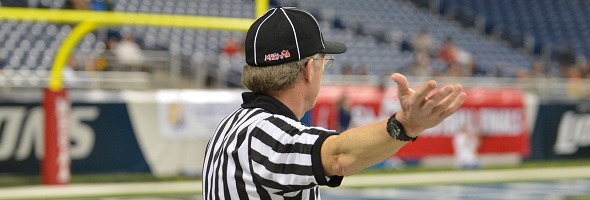
Be the Referee: Trick Plays
November 19, 2015
This week, MHSAA assistant director Mark Uyl explains which trick plays in football are allowed, and not allowed, under high school rules.
Be The Referee is a series of short messages designed to help educate people on the rules of different sports, to help them better understand the art of officiating, and to recruit officials.
Below is this week's segment - Trick Plays - Listen
In some of the biggest football games of the year, often times a trick play can be the difference between winning and losing.
Many types of these trick plays are perfectly legal – the halfback pass, the hook and ladder, or the double pass with the first pass being backward behind the line of scrimmage and the second pass going forward. There are several types of trick plays, however, that are prohibited by rule.
One is the old fumblerooski play, where a team intentionally fumbles near the center and a lineman picks up the ball and advances. A second type that is illegal is whenever you’re using substitutions or pretended substitutions to free up a receiver or player standing out along the sidelines.
Past editions:
Nov. 12: 7-Person Football Mechanics - Listen
Nov. 5: Make the Call: Personal Fouls - Listen
Oct. 29: Officials Demographics - Listen
Oct. 15: Make the Call: Intentional Grounding - Listen
Oct. 8: Playoff Selection - Listen
Oct. 1: Kick Returns - Listen
Sept. 24: Concussions - Listen
Sept. 17: Automatic First Downs - Listen
Sept. 10: Correcting a Down - Listen
Sept 3: Spearing - Listen
Aug. 27: Missed Field Goal - Listen

NFHS Voice: Punish Bad Fan Behavior
October 2, 2019
By Karissa Niehoff
NFHS Executive Director
About four weeks ago, we distributed an op-ed suggesting that inappropriate behavior by parents and other adult fans at high school sporting events was causing many officials to quit before they even reached two years on the job.
Although we received mostly positive support from this article, some people thought we went too far in telling parents to “act your age” and “stay in your own lane.” On the contrary, perhaps we should have been more direct.
Last week, one of our member state associations shared a resignation letter it had received from a 20-year veteran soccer official who had taken all the abuse he could handle. A portion of that letter follows:
“Soccer parents: you are absolutely 100% the reason we have a critical refereeing shortage and games are being cancelled left and right. And you are at least a part of the reason I’m done here. The most entitled among you are the ones that scream the loudest. And every time you do this, you tell your son or daughter the following:
‘I do not believe in you, I do not believe in your team, I do not believe in your collective ability to overcome your own adversity and you absolutely will not win and cannot do this without me tilting the table in your favor.’
“On behalf of myself and so many other referees – and I say this with every ounce of my heart and soul – shut up about the referees, and let your kids rise or fall as a team, as a FAMILY. Because the vast majority of you truly have no idea what you’re talking about, and even if you have a legitimate gripe about one play or one decision, you’re not fixing anything.”
And if that wasn’t enough, last week the Eastern Panhandle Youth Football League in West Virginia released the following statement:
“Unfortunately, it has come to the point that because of the abuse, negativity and utter disrespect shown to our officials from parents, coaches and most recently from our players, the Eastern Panhandle Officials Association president stated today that the association will no longer schedule officials for our league games at any field. This means effective immediately all remaining games are cancelled.”
This statement is from a youth league, which means the coaches are likely also parents of players, and the players are sons and daughters who are emulating their parents’ behavior.
So, no, our previous message was not too direct or emphatic. The kind of boorish parental behavior that compels a 20-year soccer official to quit cannot be allowed to continue. While we would hope that parents and other fans would embrace the concepts of education-based athletics by respecting the efforts of those men and women who officiate high school sports, that unfortunately is not occurring in some cases.
As a result, schools must adopt and enforce a strict, fan behavior policy. In soccer, a player receives a “yellow card” as a first warning for unsportsmanlike conduct. If the action occurs again, the player is hit with a “red card” and is ejected from the contest. Some schools have implemented a similar penalty structure for parents and other fans – not just at soccer games but all high school events. If the inappropriate behavior and verbal abuse of officials continues after one warning, the person is removed from the venue. There must be consequences for these offenders before we lose any more officials.
Most of the 7.9 million participants in high school sports are on the fields and courts every day to have fun and compete as a team with their classmates, and the 300,000-plus officials assist in that process. Now, if parents would let the players play and the officials officiate!
Dr. Karissa L. Niehoff is in her second year as executive director of the National Federation of State High School Associations (NFHS) in Indianapolis, Indiana. She is the first female to head the national leadership organization for high school athletics and performing arts activities and the sixth full-time executive director of the NFHS, which celebrated its 100th year of service during the 2018-19 school year. She previously was executive director of the Connecticut Association of Schools-Connecticut Interscholastic Athletic Conference for seven years.

